This blog is now located at http://cedrusmonte.blogspot.com/. You will be automatically redirected in 30 seconds, or you may click here. For feed subscribers, please update your feed subscriptions to http://cedrusmonte.blogspot.com/rss.xml.
A Musing
There are many elements that distinguish Jung and his work. One of the most powerful forces in Jung's life was the impetus to re-create himself, again and again, old ideas constantly being reworked or replaced with the fecund muse of the moment. This force asserted itself in his life at the risk of death more than once, both physical and symbolic. Jung was a scientist, yes. A mystic, definitely. (I have never thought that a pejorative term in relation to his work.) And, an artist. He was an artist not because he painted or worked with stone, but because he was willing to risk death - rejection, ridicule, disenfranchisement, banishment, and loss of life - to find the truth of his life as the Muse wanted it to be lived. My friend, Antero, wrote again (catalyzing this writing). He says: An artist recreates him/herself over lifelong organic processes of molting his/her forms and creations -- the opus -- towards a state of perpetual emergence. As we know, the artist remains on intimate terms with The Fertile Void and when the incumbent pressures of his/her humanity swell forth, the artist ripens to blossom onto the canvas, the blank page, the empty stage, the silver screen. The true artist knows life itself as the alchemical prima materia and will, at the drop of a hat, change his/her life to best serve Creation...while asking her/himself over and over and over again:
Just what kind of life might the Muses find most appealing?Jung didn't want to have his work institutionalized, at least not in the beginning. I don't really know what changed his mind, but I doubt he was ever completely enthusiastic about codifying something that grew out of his particular relationship with the Muse. Indeed, how can one write the procedure manual, complete with regulations and by-laws, that tells us how to wrestle with the Angel when we meet him on the road to the Unknown?
A New Wrinkle
In addition to being in contact with Jungian colleagues around the question of hierarchy and groups, Eros, and more, I have also been in touch with some friends and colleagues from other disciplines. The following is a comment Antero Alli sent in response to The Third (the post below). I've known Antero since 1980. He is an independent film maker, an actor, a self-created scholar of ritual, an astrologer, and an original...of the highest order. He has come into my dreams a few times since meeting him, always carrying the spirit of the creative animus. His website address is at the bottom of these comments, wherein lie treasures. 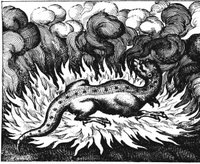 Cedrus Cedrus
The support you give these important ideas involving the cultivation of receptivity (emptying), empathy and the embodiment of Eros express a very high level of consciousness that, I believe, can only be absorbed, integrated and transmitted at the level of the individual. I do not believe this can ever be realized at the level of any institution, no matter what ideals that organization was supposedly based on, due to two key factors. Perhaps in ideal but not in reality.
First, it seems the spectrum of consciousness finds its highest point of expression in the individual experience and its lowest point in crowds, with the lowest common denominator to ratchet lower still with each increase in numbers. Secondly, there follows a natural (and some say regretful) progression from the numen of originating epiphany towards its gradual corruption of consciousness by encasement in beliefs, assumptions, doctrines, systems of hierarchy, defining typologies and stone tablet dogmas as demonstrated by the world's religions and also, by many institutes of higher learning.
In response to these two factors, I choose to participate in a silent revolution of self-work that nurtures and challenges the innate autonomy in myself and those I meet and create with. I no longer seek the respect, approval and regard of institutions of any sort. I do attempt to learn from their unique evolutionary cycles something about the corruption of what once began as a perception so pure as to stand naked before God and simply die to be reborn.
Truly,
Antero Alliwww.paratheatrical.com
In the end, I'm afraid I must agree with him. Perhaps this is my dilemma. The Artist creates "something out of nothing," which is the process described in many a creation myth. New growth needs this impulse, "...the cultivation of receptivity (emptying)...." Without it, calcification sets in and things commence to rigidify. Indisputably, I've been having considerable trouble with my joints lately.
The Third
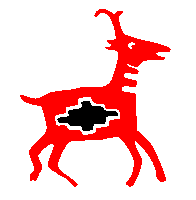 This will be the third in the series of reflections on hierarchy in relation to the practice of Jungian analysis. It will probably be the last. It is clear that exchange will need to come in another form. Most of the people I am in close association with are introverts and intuitives. Finding out how to click on the word at the end of each post that says "comments" - and then leave one - is a challenge. I completely understand this; if I didn't have this website, I would be in the same predicament! With the exception of Coyote, who has left very inspiring commentary on the post before this one, other people's comments have gone unheard. At this point, I would like to share just a few exerpts with you. From one colleague: I don't know that I have much hope about institutions, including Jungian trainings, being able to retain the fresh inspiration that gave them their original impetus. Someone else ...likens the current trend in Jungian institutional life to the decay of the Christian movement, passing over into an institution that was no longer about spiritual life at all, and sometimes has hurt more than it helped. I think his point of view is that these movements inevitably rise and fall. And meanwhile, out in the world, what is real is continually re-born in new forms. Institutions cannot contain the spirit, which is a good as well as a bad thing. Many of my colleagues, in my view, have been extremely philosophical about certain things, in a good way. With another colleague, I commended her ability to be as objective as she was about different experiences, to which she wrote: This group of analysts was much more unconscious, and much less willing to look at their unconscious, than I would ever have imagined. At first it was a shock. And then I just realized that they are who they are. It was like a reality check, a wake up call. To see through my own projections and expectations and just see regular unconscious human beings, no different than anyone else, even with all their "training" or "self-inquiry" or "depth work." So my attitude is not really a "high road;" I just don't have my projections or expectations any more.
Your [Cedrus']statement:
"It seems to me that it is a matter of heeding the call for true and deep compassion for other human beings and that if we are to become greater souls on this planet, embodied beings of spirit, we will need to extend ourselves in whatever way we can to this task."really sums up the core of what we as analysts need to be attuning to. So few, I think, really come to this. It's sad because the potential good from what Jung brought is so enormous yet his followers haven't managed to really take the teachings and truly apply them.And yet another colleague writes: I no longer look to the Jung community for succor, outside of my deep personal friendships with individual analysts. But if I look to the collective, like you I find no nurture and I see the collective really as just another institutional glob. I just don't expect anything else anymore. I therefore do not participate in training. Just do my thing and work with our local
group to keep us going as professionals with a face in the therapy world.On a radio program recently, someone (I'm sorry not to have made note of the reference) said that hierarchy needs and feeds on poverty and ignorance. I feel this is very true. In reference to our subject at hand, I feel that the poverty and ignorance we experience within this hierarchy is the inability to be open in the heart, and the inability to truly embody the creative impulse. Revitalization requires tremendous courage and considerable wisdom, especially in light of the pressures to maintain the status quo for the sake of security and stability. The ability to revitalize also requires the courage to have an open heart. It requires that we encourage open-hearted exchange. My experience has shown me, and others as well, that there is a tremendous armoring of the heart in these trainings. Eros is spoken of and reflected on, but it is rarely embodied. Virtually nowhere in the official Jungian training programs have I encountered a call for this way of learning, for the need to embody this kind of openness, openly, with each other. It is not part of our group as Jungians. It gets relegated to "the hour." Of course there are exceptions. There are always exceptions. And for those, I am grateful.
The Clear Bead
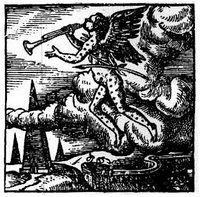 Rumi writes: The clear bead at the center changes everything.
There are no edges to my loving now.
I've heard it said there's a window that opens
from one mind to another,
but if there's no wall, there's no need
for fitting the window, or the latch.Cultivating emptiness seems to be exactly the opposite of what most endeavors in the world encourage us to do. We try to fill ourselves up with so many things that our minds burst and our bodies go numb. We desperately try to be someone. Sincerely. We try desperately and sincerely to be someone. For the greater good, we say, this desperation and striving serves. If we have nice things, things that are coveted by the many, we feel somehow that we are doing a good job at being a success. Again, Rumi speaks: Someone who goes with half a loaf of bread
to a small place that fits like a nest around him,
someone who wants no more, who's not himself
longed for by anyone else,
He is a letter to everyone. You open it.
It says, Live. Truly living and cultivating emptiness require authenticity, a willingness to drop masks and pretense. They demand true courage and humility, simplicity and an open heart. Cultivating emptiness requires living from the clear bead of the heart. If there are walls around our heart, if our minds are jammed tight with what we are told is important to know, how are we ever able to open our hearts and minds to the other? How can we ever follow the movement of soul? I wonder how different training programs in the psychoanalytic world would be if these principles were not only taught, but followed, if they were present not only in content but also in the day to day process of teaching and learning. Clear beads are not generally encouraged, especially within endeavors involving power, prestige and a sense of elitism, like psychoanalytic institutes. Usually, the more you have the better it is. In my professional world this would mean more analysands, more articles published, more books written, more lectures slated. Always more. I'm not saying that these things are bad. That's not it. But without a deep sense of consciousness about what drives us to these things, we tend to mistake having them for a sense of worth and meaning and accomplishment. We tend to put them between us and the other, creating a wall, a window, and a latch. I wonder what the practice of analysis would be without the assumed power, prestige and elitism that accompany the profession. I have heard repeatedly from others about the lack of genuine loving kindness, the lack of heart, in the process of personal exchange within the institutional psychoanalytic setting. Indeed, I have seen this myself. I do not believe this way of acting is intentional, necessarily, but perhaps the lack of awareness about the nature of our interpersonal exchange is even more insidious and damaging than outright intention. If it is not intentional then what are we doing? As Otto Kernberg has said here when writing about psychoanalytic institutions, it is not enough to bring our grief "to the hour," meaning it is not enough to take to one's analyst the wounds received from abuse of power and lack of sensitivity within the hierarchical structure. As long as the problem is treated solely as the individual's "shadow", this lack of true loving kindness and the inability to act from a place that is void of the will to personal power remains. As long as all players do not examine themselves openly and with ruthless honesty, genuine creative life suffers. The place and importance of process is denied. In a relatively self-contained hierarchical system it is easy for this to happen. It is clear that these kinds of concerns are not exclusive to any one profession or group. I think we are all, individually and collectively, struggling to find the answers to these problems - to the loss of soul, the loss of our humanity. I've perhaps rambled too much here. Cast the net into too diverse waters. But none of this is supposed to be perfectly, logically stated. The observations are merely musings, my way to open a path of dialogue about these concerns. Even if there is no public exchange here on this page, perhaps the ideas themselves will spark something in someone and help turn the energy around, somewhere, some way. I realize it can feel uncomfortable to say anything in such an open forum. I have already heard from several people in private exchange. And I thank you for that. It is the kind of response that helps keep the clear bead of the heart intact.
The Path Less Followed
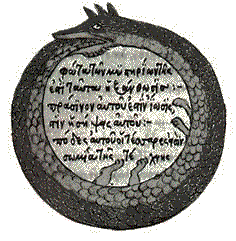 The following comments arise from my own personal feelings and observations. They are not necessarily fact, nor are they necessarily true for anyone other than myself. In the last few years I have felt quite strongly that there is something amiss in the practice of analytical psychology. It's not the psychology itself as Jung created it that I feel is problematic. Not at all. Rather, it is what I perceive to be the hierarchical institutionalization of training and practice. It is also the form of the practice itself that feels, for me personally, more and more out of Tao. This feeling coupled with many unfortunate events during the last few years, with and within my own particular group of Jungian colleagues, has led me to feel the need to retreat from an organized Jungian community. I feel less and less kinship with any hierarchy, and with what I perceive to be the casting-in-stone bureaucracy that apparently determines the current Jungian path - a path which previously thrived on the intricacies of soul rather than on the stoney dictates of institutionalization and bureaucracy. Internally, this has left me feeling lost and at sea for several years, wondering how I should be a Jungian in the world - if, indeed, at all. I am still looking for community, for communitas. Interestingly enough, I have increasingly heard from other Jungians who feel the same as I do. They are flung far and wide across the globe - in Canada, America, Switzerland, Brazil. I am sure if I were to continue speaking with other Jungians around the world, I would find many more in still other countries. My sense is that there is a great need to address what I, and apparently others, perceive to be amiss in the Jungian world. And we would need to address our concerns within a form and a forum that does not perpetuate the same hierarchical and institutional approach. An alternative approach would embrace the creative, non-hierarchical, round-table democratic practices that are deeply aligned with what can be described as the feminine principle, a way of perceiving that is greatly marginalized in a hierarchy. The new approach for our inquiry might be far less organized and ordered, allowing for the spirit of the moment to usher in the necessary focus. It would also include the world at large, directly, palpably. We would not be listening to someone give a formal lecture standing at the front of a room, reading from a paper. We would not, necessarily, be following a leader in an experiential workshop. Inquiry and presentation would be live, in the moment, attuned to the central question. It would be a lot of other things but that will be the topic of other posts on this page. When I say "feminine principle" I am not talking about women, or women's liberation or any other such thing. I am talking about the ability to be in relationship with each other equally, not hierarchically, placing greater value on process rather than product. I am speaking of an approach that embraces creative chaos, fosters the desire to receive each other through the heart, through Eros, and to have every voice truly heard. It might be nearly impossible to run an institute in these ways, but it is, to a large extent, what many of the Jungian training institutes profess as the centerpiece when working with the psyche, with the unconscious: we are instructed to follow the movements of soul. The way I see it at this point, institutes do not, maybe cannot, practice what they teach. In the coming posts, I hope to continue addressing this subject in whatever ways present themselves. Eventually, I hope to convince some few others who have similar sentiments to come together in an informal forum in a special place of culture and nature that draws and nourishes artists, scholars, soulworkers and laborers alike. That might happen, and it might not. We will have to wait and see. In the meantime, I will "blog"!
A Deeper Love
I've known PAZ for 20 years. Most of the photographs on this blog were taken by him. Some of his art work is also included, as you can see here and in the post before this one. As artists, he and I stole from each other all the time. We were openly jealous of each other's work, wanting to claim it for ourselves. We soon learned it was our highest compliment to each other, this thievery and jealousy and covetousness. Because we respected each other's work, when these feelings were stirred we knew that what we had just done was good and had intrinsic value. 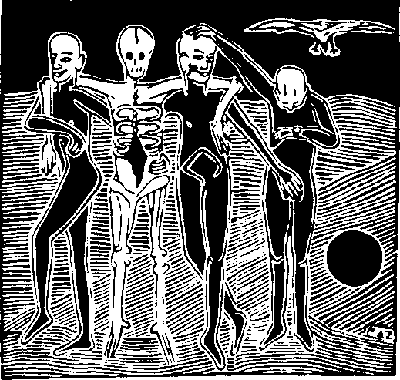 "Bringing Brother Death Home" "Bringing Brother Death Home"We reveled openly in these shadow elements. This was and is one of the deepest expressions of love I have known, some of the grandest acts of generosity I have ever experienced. We did not deny our primitive desires. We used them to nurture each other into a deeper creative spirit, into spaces where we could give the best of what we had to give. Living is much easier knowing that I have shared this with another human being. Dying will be the same: easier for having lived this. I can imagine it might make many lives easier.
In This Body
Kabir was a 14th century Sufi mystic and poet from Northern India. Listen to what he has to stay about the body: In This BodyIn this body forests and hamlets, right here mountains and trees. In this body gardens and groves, right here the one who waters them. In this body gold and silver, right here the market spread out. In this body diamonds and pearls, right here the one who tests them. In this body seven oceans, right here rivers and streams. In this body moon and sun, right here a million stars. In this body lightening flashing, right here brilliance bursting. In this body the unstruck sound roaring, streams of nectar pouring. In this body the three worlds, right here the one who made them. Kabir says, listen seekers: right here my own guru! and yet another....
Where Did You Come From?Where did you come from? Where are you going? Get the news from your own body! 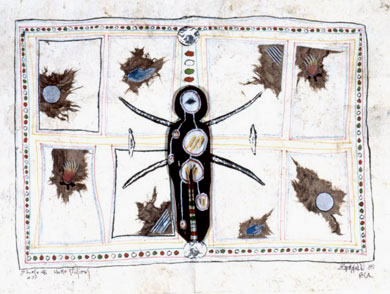 "Homo Spiritus" "Homo Spiritus"It's all right here...if only we can stop and listen.
Return
It has indeed been a long time since writing anything here. It doesn't mean I haven't been reflecting, however. Today is Good Friday. I am often enlivened on Good Friday. Enlivened by the collective movement inward. It is a day when things become very quiet, at least in many predominantly Christian countries. Here in Zurich (and all of Switzerland for that matter), it is a full holiday or, probably better said, holy day. Almost all stores and businesses are closed. Yes, I am enlivened by the collective movement toward quietude and reflection, or at least the semblance of it. Even if it is somewhat artificial, one can clearly feel the difference between a day like this and a day when it is all happening "out there." This is an inner celebration...of Death. And that, too, enlivens me - that a day is taken out of the collective calendar to acknowledge Death. How absolutely rare this is. And in it, I rejoice. How could consciousness rise again and again, if it were not for this time of dying? How could we ever return if we did not first fade away into death? Perhaps if we could really do this, acknowledge Death, we would not need to kill innocents, and innocence, to feel, erroneously, that we will prevail and survive. To all those who have lost their lives in sacrifice to our inability to acknowledge the real meaning of Death, I bow in deepest respect and deepest sorrow. I also bow in gratitude. Their suffering is innocent suffering, just as Christ's suffering was innocent and, therefore, somehow redemptive - even if unconscious and unacknowledged. To all those in Iraq and other places who are tortured, maimed and decimated by the shock and awe of Death's denial, I suffer with you. May the consciousness of all soon be Raised enough to stop this criminal madness.
|
|
Image Galleries
The following contain larger versions of images posted on these pages and are keyed to corresponding Reflections posts.
(Photos: Paul Anton Zorn)
|





 "Bringing Brother Death Home"
"Bringing Brother Death Home" "Homo Spiritus"
"Homo Spiritus"